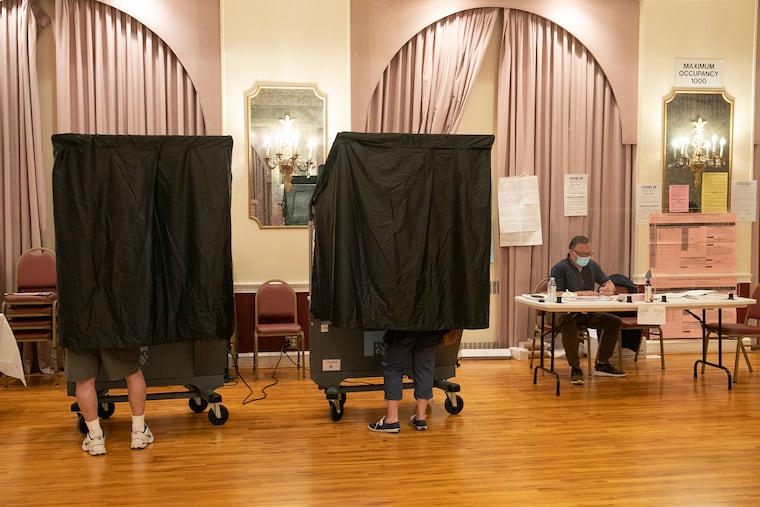Philly’s elections are secure, but our poll infrastructure needs improvement | Opinion
More poll worker training, city commissioner accountability, and funding will improve our system.

I’ve been a poll worker in Philadelphia for four years. The morning of the recent primary election, May 18, I was alarmed to hear reports that voters were mistakenly given the option of selecting their own political party before casting their ballots.
In Pennsylvania, a voter must be registered as a member of a political party in order to vote in that party’s primary. If poll workers don’t designate voters’ party before giving them a ballot, that, for example, lets Republicans vote in the Democratic race.
While the margin in the hotly contested district attorney race was wide enough that a small amount of voter fraud would be unlikely to change the outcome, some of the judicial races came down to margins of just about a thousand votes.
» READ MORE: Philly will count undated mail ballots the Pa. Supreme Court said should be thrown out
What’s more, many polling places ended up understaffed on May 18, creating disorder at multiple locations.
Our elections are secure, but our infrastructure — the rules and procedures designed to protect the election process — is weak. Urgent changes are needed to prevent an election crisis, in which we cannot reliably determine who won the most votes.
At the heart of the problem is the City Commissioners Office, a three-member board in charge of elections in Philadelphia. For decades, people have raised concerns about this office, in which elected officials oversee elections, and poor governance is the norm; some have even suggested it be abolished altogether.
Philly, we need to do better. Here are some key steps to help keep our elections running safely and smoothly:
1. Overhaul the system for staffing and training poll workers.
The city needs more than 5,000 poll workers at approximately 1,700 divisions across Philadelphia, and proper staffing is a daunting challenge. The process for recruiting, training, and assigning poll workers deserves a dedicated team of employees, a good database, and creative thinking. Training is particularly important, and likely not adequate as-is: The stipulation that poll workers need to select a voter’s party is mentioned in one sentence on page 37 of a dense, 52-page training manual.
The members of the City Commissioners Office are focused on elections year-round, and yet they largely punt the responsibility of recruiting and training poll workers to the ward leaders, who are partisan, unpaid, and often lead busy lives outside of Election Day. Communication breakdowns, confusion, and inefficiencies can result.
The City Commissioners Office has a troubled history, but election integrity is their job. They must start playing a stronger role in recruiting and training poll workers so that Election Day runs smoothly.
2. Hold the city commissioners accountable.
City commissioners are elected officials, and they need to answer for their missteps — such as covering up sanctions (as did chairwoman Lisa Marie Deeley, who initially lied about losing her notary license when she failed to check a woman’s ID before verifying her signature on documents involving an acquaintance) or making excuses for poor staffing instead of taking responsibility. While I’m glad to now have city commissioners who show up for work (unlike former Commissioner Anthony Clark), I’d like to see the bar raised a bit higher. In 2019, despite a voting machine controversy, a surge of interest in transforming the office, and a number of passionate and knowledgeable candidates for city commissioner, voters ultimately selected the party-endorsed candidates (including Deeley), rather than reformer candidates endorsed by The Inquirer and other groups. When people make mistakes, don’t reelect them.
3. Allocate more government funding to election administration.
While we hold the commissioners responsible for their missteps, we also need to acknowledge that election administration is hard. If the City Commissioners Office remains in charge of elections, they need funding for additional staff and technology. For the high-stakes 2020 presidential election, the City Commissioners Office received $10 million in philanthropic funding to more effectively administer the election. But we cannot continue to rely on one-time infusions of private funding. Earlier this month, the commissioners asked City Council to increase the office’s General Fund budget for the next fiscal year by $7 million more than the administration’s proposed $18 million, which I think is a good step.
This is not an easy problem to solve, but in Philly, we are always up for a challenge. I’m calling on my fellow voters and poll workers to hold the city commissioners accountable, and on our elected officials to advocate for adequately funded and well-administered elections. Our democratic future depends on it.
Kate Rivera is a poll worker in the 31st Ward, treasurer of Riverwards Area Democrats, and an independent consultant. She worked on Jen Devor’s campaign for city commissioner in 2019.